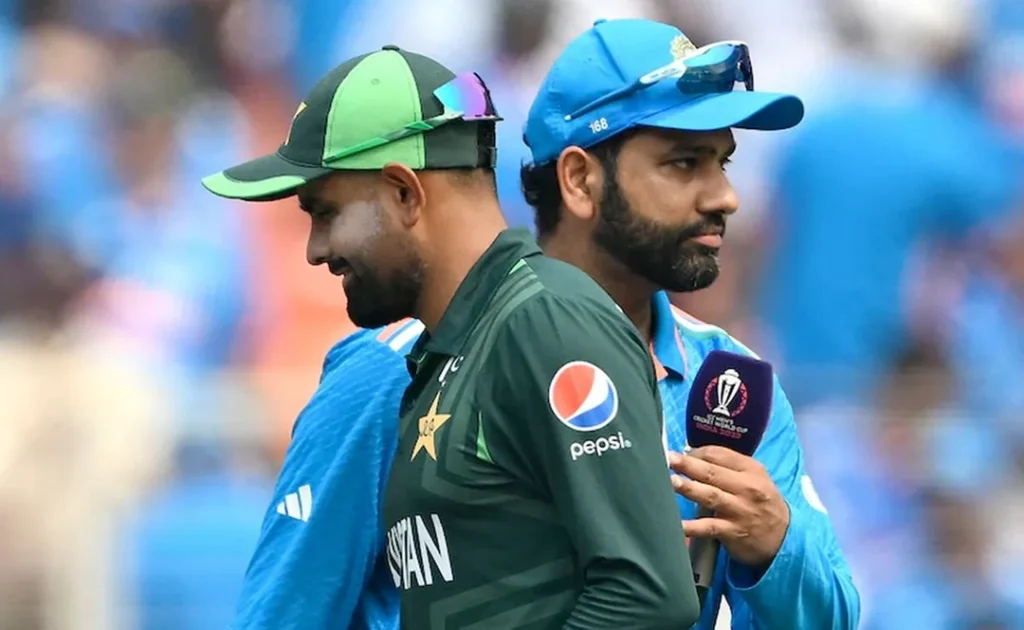The upcoming ICC Champions Trophy 2025 has sparked intense debates, with political tensions between India and Pakistan spilling over into the cricketing arena. While Pakistan is set to host the prestigious tournament, the Board of Control for Cricket in India (BCCI) has formally informed the International Cricket Council (ICC) that the Indian cricket team will not be traveling to Pakistan due to security concerns. This decision has prompted a hard stance from the Pakistan Cricket Board (PCB) and left the ICC with complex decisions regarding the future of the tournament.

Background: Longstanding Tensions Affecting Cricket
India and Pakistan, despite being two of the world’s most passionate cricketing nations, have not played a bilateral series since 2012 due to political tensions. Encounters between the two cricket giants are restricted to ICC and Asian Cricket Council events, where they draw massive viewership and fan enthusiasm. The last time India toured Pakistan was in 2006, and since then, cricketing ties between the nations have remained strained.
In the Champions Trophy 2025, however, the stakes are higher. As the designated host nation, Pakistan has begun preparing to welcome the tournament, but India’s refusal to participate on Pakistani soil has triggered a dispute that the ICC will have to mediate carefully.
BCCI’s Official Response and Security Concerns
In a recent response to the ICC, the BCCI highlighted serious security concerns regarding the safety of the Indian cricket team in Pakistan. According to reports from Sports Tak, BCCI has prepared a detailed dossier outlining the specific risks that Indian players might face if they travel to Pakistan. The document references recent terrorism incidents in Pakistan, particularly those involving cross-border terrorism, emphasizing that the Indian cricket team could be a high-profile target for terrorist attacks.
The BCCI’s dossier also cites the 2009 attack on the Sri Lankan cricket team in Lahore, which has left a lasting impact on international perceptions of security in Pakistan. In that incident, a terrorist attack targeted the Sri Lankan team bus, leading to injuries among players and security personnel, and forcing Pakistan to play the majority of its “home” games in neutral venues such as the United Arab Emirates for several years. The BCCI argues that a similar risk could threaten Indian players, especially given the sensitive political climate and heightened security concerns.
Related Article: Trailblazing Women Cricketers: Influential Players Changing the Game of Cricket Worldwide
PCB’s Stance and Rejection of the Hybrid Model
The Pakistan Cricket Board (PCB), understandably displeased with BCCI’s decision, has taken a firm stance. The PCB has already written to the ICC, urging it to address the BCCI’s refusal and provide a formal explanation. The PCB has outright rejected the BCCI’s proposed “hybrid model,” which would split the tournament’s hosting between Pakistan and the United Arab Emirates (UAE), with five out of 15 games held in UAE. The PCB insists that the entire tournament be hosted solely within Pakistan, as originally planned.
From the PCB’s perspective, agreeing to a hybrid model could set a precedent for future tournaments, jeopardizing Pakistan’s standing as a safe venue for international cricket. PCB officials argue that the country has made significant strides in enhancing security for international teams over the past decade and has successfully hosted major teams, including Australia, England, and New Zealand, in recent years without incident.
The ICC’s Options: Balancing Security, Fairness, and Financial Impact
With neither BCCI nor PCB budging from their positions, the ICC is faced with the challenge of finding a solution that accommodates security concerns, respects the designated host nation, and preserves the tournament’s revenue potential. Currently, the ICC is considering three possible courses of action:
- Persuade PCB to Accept the Hybrid Model: One option is to convince PCB to allow five games to be played in UAE, a location that has previously served as a neutral venue for Pakistan’s “home” matches. However, the PCB’s firm rejection of this proposal makes this a challenging route for the ICC, especially given the PCB’s concern over its implications for Pakistan’s image as a safe host.
- Relocate the Champions Trophy: The ICC could decide to relocate the entire tournament to a different country. While this could mitigate security concerns, it would undoubtedly draw backlash from the PCB, which may consider withdrawing from the tournament altogether. Such a move could also strain ICC’s relationship with PCB and lead to potential legal and diplomatic complications.
- Postpone the Tournament: The ICC might opt to postpone the Champions Trophy to allow more time for diplomatic discussions. However, this option could significantly impact the tournament’s financial projections, affecting both the ICC and the PCB’s revenue expectations. With the Champions Trophy being a marquee ICC event, any delay would have broad implications for international cricket’s financial ecosystem.
The Broader Implications for International Cricket
The outcome of this dispute could have a long-lasting impact on international cricket, particularly in terms of the politics of hosting rights. The BCCI’s dominance in world cricket, owing to its financial influence and viewership numbers, adds complexity to the ICC’s decisions, as India’s participation is crucial for the tournament’s global appeal and revenue. However, if the ICC chooses to move the tournament from Pakistan, it may face criticism for favoring one nation’s interests over another’s hosting rights.
Related Article: Top Most Beautiful Female Athletes in the World and Their Relationship Status: Married or Single?
For Pakistan, the ICC’s final decision will not only affect the Champions Trophy but could also influence the future of international cricket events within its borders. Success in hosting the Champions Trophy could bolster Pakistan’s reputation as a secure destination for international teams, opening doors to future tournaments and boosting cricket’s popularity within the country. Conversely, relocating or splitting the event could damage PCB’s efforts to revive international cricket on its home soil.
Cricket Fans React to the Ongoing Dispute
The unresolved nature of this issue has stirred mixed reactions among fans across the world. Indian fans generally support BCCI’s decision to prioritize player safety, while Pakistani fans view the refusal as an unfair denial of Pakistan’s right to host an ICC event. Many cricket enthusiasts, regardless of nationality, hope for a diplomatic resolution that allows players from both countries to compete under safe conditions while honoring the spirit of the game.
Social media platforms have been abuzz with opinions, with some calling for a compromise that respects Pakistan’s efforts to improve security while addressing BCCI’s valid concerns. Others fear that prolonged political standoffs could limit opportunities for fans to witness India-Pakistan matchups, one of cricket’s most celebrated rivalries, on Pakistani soil.
What Lies Ahead for the Champions Trophy?
As the ICC weighs its options, a resolution to this standoff remains uncertain. The decision-making process will likely involve discussions at the highest levels, where financial interests, political sensitivities, and logistical considerations will all play a role. Regardless of the outcome, the situation underscores the growing challenges international sports organizations face in navigating the complex interplay of politics and sports.
Related Article: Everything You Need to Know About Kabaddi: Rules, Top Teams, and Star Players
In the coming months, all eyes will be on the ICC to see whether it can broker a solution that allows the Champions Trophy to proceed as planned. Whether held in Pakistan, in a hybrid model, or at an alternate venue, the 2025 Champions Trophy is poised to be an unforgettable tournament—highlighting the power of cricket to unite, challenge, and inspire across boundaries.






